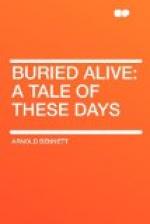“You know, I’ve been thinking for years of getting married again. And if you really are thinking of getting married, what are you to do? You may sit in a chair and wait till eggs are sixpence a dozen, and you’ll be no nearer. You must do something. And what is there except a matrimonial agency? I say—what’s the matter with a matrimonial agency, anyhow? If you want to get married, you want to get married, and it’s no use pretending you don’t. I do hate pretending, I do. No shame in wanting to get married, is there? I think a matrimonial agency is a very good, useful thing. They say you’re swindled. Well, those that are deserve to be. You can be swindled without a matrimonial agency, seems to me. Not that I’ve ever been. Plain common-sense people never are. No, if you ask me, matrimonial agencies are the most sensible things—after dress-shields—that’s ever been invented. And I’m sure if anything comes of this, I shall pay the fees with the greatest pleasure. Now don’t you agree with me?”
The whole mystery stood explained.
“Absolutely!” he said.
And felt the skin creeping in the small of his back.
* * * * *
CHAPTER III
The Photograph
From the moment of Mrs. Challice’s remarks in favour of matrimonial agencies Priam Farll’s existence became a torture to him. She was what he had always been accustomed to think of as “a very decent woman”; but really...! The sentence is not finished because Priam never finished it in his own mind. Fifty times he conducted the sentence as far as ‘really,’ and there it dissolved into an uncomfortable cloud.
“I suppose we shall have to be going,” said she, when her ice had been eaten and his had melted.
“Yes,” said he, and added to himself, “But where?”
However, it would be a relief to get out of the restaurant, and he called for the bill.
While they were waiting for the bill the situation grew more strained. Priam was aware of a desire to fling down sovereigns on the table and rush wildly away. Even Mrs. Challice, vaguely feeling this, had a difficulty in conversing.
“You are like your photograph!” she remarked, glancing at his face which—it should be said—had very much changed within half-an-hour. He had a face capable of a hundred expressions per day. His present expression was one of his anxious expressions, medium in degree. It can be figured in the mask of a person who is locked up in an iron strongroom, and, feeling ill at ease, notices that the walls are getting red-hot at the corners.
“Like my photograph?” he exclaimed, astonished that he should resemble Leek’s photograph.
“Yes,” she asseverated stoutly. “I knew you at once. Especially by the nose.”
“Have you got it here?” he asked, interested to see what portrait of Leek had a nose like his own.




